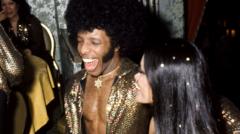As the Band Aid charity single returns for a 40th anniversary celebration, criticisms about its portrayal of Africa have resurfaced, with artists and academics questioning its cultural impact and the narrative it perpetuates about the continent.
Band Aid Revisited: The Legacy and Criticism of a Charity Anthem

Band Aid Revisited: The Legacy and Criticism of a Charity Anthem
The release of a new version of the Band Aid single prompts reflection on the historical and modern-day implications of its messages regarding Africa and its people.
The release of a new version of the Band Aid single, marking 40 years since its inception, has reignited discussions surrounding its thematic representation and impact on perceptions of Africa. Originally recorded in 1984, "Do They Know It’s Christmas?" emerged as a response to the devastating famine in Ethiopia, created under the guidance of musicians Bob Geldof and Midge Ure. The song became an iconic moment in celebrity fundraising and led to the Live Aid concert, catalyzing a wave of charitable initiatives.
However, as popular artists come together once more to update the classic, criticism has grown about its depiction of Africa as a place of perpetual suffering. Dawit Giorgis, an Ethiopian official during the famine, highlighted the problematic phrasing of the song, expressing disbelief that such a question would arise about a nation where Christmas has long, deep-rooted cultural significance. He recalls the indignation felt among his colleagues, stating, "We knew Christmas before your ancestors."
Despite acknowledging the life-saving impact of Band Aid's fundraising efforts, many modern artists, including Ed Sheeran and British-Ghanaian rapper Fuse ODG, have voiced their unease with the song’s underlying narrative. Sheeran recently commented that the lyrics suggest there is "no peace and joy in Africa," prompting a discussion about how the portrayal has remained stagnant even as the realities of African nations evolve.
Critics argue that fundraising initiatives like Band Aid rely on outdated stereotypes that undermine the dignity and agency of African communities. Lena Bheeroo from Bond, an umbrella organization for various charities, condemned the release of the updated single, emphasizing that such projects reinforce colonial attitudes. This sentiment is echoed by Kenyan writer Patrick Gathara, who believes that the media’s depiction of African crises often casts people as helpless victims rather than resilient individuals.
The cultural landscape has changed significantly since the 1980s, with many advocating for a reformation in how charities engage with communities. Academic Edward Ademolu posits that the time has come for a new approach—one that allows Africans to shape their narratives rather than remain subjects of external charity ventures. "Perhaps it's time to abandon the broken record and start anew," he suggests.
Relying on celebrity endorsements remains a common tactic for charities, despite its potential to overshadow the issue being addressed. As discussions continue, there is a clear call for African voices to be forefronted in future charitable efforts, promoting a more holistic and empowered view of the continent’s stories.
The return of Band Aid’s anthem has sparked a critical conversation about the importance of representation in philanthropy, aligning with a broader movement that seeks to ensure Africa is not merely a backdrop for Western charity narratives, but an active contributor to its portrayal.





















